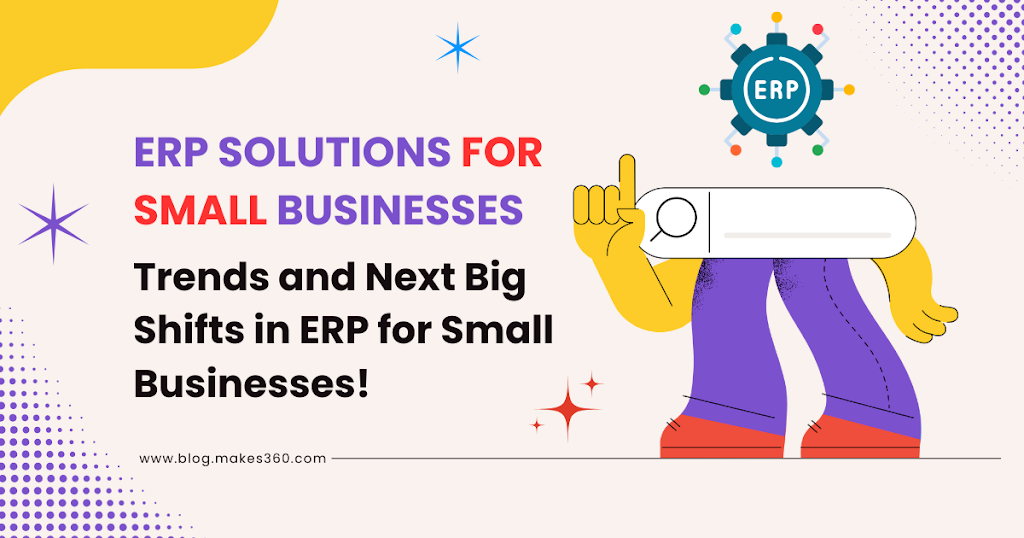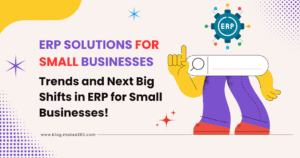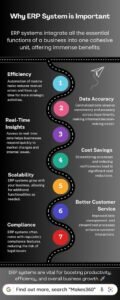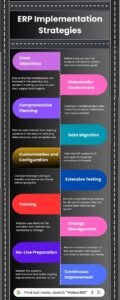Did you know that companies using ERP systems for small businesses are 2.5 times more likely to improve operational efficiency and reduce costs?
ERP solutions for small businesses have been a go-to tool for streamlining operations, managing resources, and enabling growth. But are ERP systems still as relevant for small businesses in today’
s fast-evolving business environment?
Recent trends and expert opinions indicate that the role of ERP software for small businesses is evolving. While it remains a critical tool for enhancing efficiency, its integration with technologies like cloud computing, AI, and IoT has added new dimensions. This evolution makes it even more effective in addressing modern business challenges.
This means that ERP for small businesses is still essential, but its benefits go beyond basic operations. To unlock its full potential, small businesses need to explore advanced features like data analytics, automated workflows, and scalability. Staying updated with these advancements ensures that small businesses can maximize growth while staying competitive.
The importance of ERP software for small businesses has shifted, and embracing these changes is key to reaping its full benefits.
ERP solutions have become a must-have for small businesses to succeed in today’s competitive market. Companies that use ERP systems can improve how they work by up to 40%. This boost means better productivity, lower costs, and overall improved performance, helping businesses compete more effectively and grow sustainably.
What is ERP and Why ERP System is Important?
The Changing Role of ERP
For small businesses, the combination of ERP with new technologies like AI and automation is crucial. AI helps with data analysis, automates routine tasks, and improves decision-making. Automation reduces human errors, saving money and helping businesses use resources efficiently. When ERP and AI work together, small businesses can operate more efficiently, cut costs, and respond quickly to market changes.
Modern ERP systems are also highly customizable, which means they can be adapted to meet the specific needs of different industries. This customization allows small businesses to create a solution that works for their unique processes, providing a tailored approach that enhances productivity and effectiveness. Additionally, cloud-based ERP systems make these powerful tools accessible to small businesses with limited budgets, allowing them to benefit from enterprise-level capabilities without the high upfront cost.
Benefits of ERP for Small Businesses
1. Centralized Data Management
ERP systems store all business data in one place, making it easy for different teams to access the same information in real time. This reduces errors, improves teamwork, and makes decision-making faster and more accurate. Centralized data also makes reporting easier and helps businesses quickly gain insights into their operations. It ensures that everyone in the organization is working with the most up-to-date information, which is crucial for efficiency.
2. Better Efficiency
ERP systems make daily tasks like inventory management, order processing, and financial reporting easier, saving time and effort. Automating these processes allows small businesses to focus on more important activities, like building customer relationships and creating new products. By eliminating manual processes, ERP reduces the likelihood of errors and helps employees use their time more productively.
3. Cost Savings
Although ERP systems can be expensive to set up, they save money in the long run by improving processes, reducing errors, and increasing productivity. Better inventory management also helps reduce extra costs and improve cash flow. By optimizing resource use, ERP systems help small businesses avoid waste and ensure they are getting the most value out of their investments.
4. Improved Customer Service
ERP systems give a complete view of customer information, helping businesses respond quickly to customer questions and provide better service. Many ERP solutions also include CRM features, which help small businesses understand their customers better and build stronger relationships. By keeping track of customer interactions and preferences, businesses can offer personalized services that increase customer satisfaction and loyalty.
5. Scalability
ERP solutions grow with your business. As your business expands, you can add new features, users, or locations as needed. This means you won’t outgrow your ERP system, and it will always have the tools you need. Scalability is essential for businesses that are planning for long-term growth, as it ensures that the system can adapt to new challenges and opportunities without requiring a complete overhaul.
6. Data-Driven Decisions
ERP systems provide real-time data and useful reports that help small businesses make better decisions. Business owners can analyze data to identify trends, track performance, and make strategic choices that drive growth. Access to accurate data helps businesses plan effectively and respond to changes in the market with confidence.
7. Regulatory Compliance:
ERP systems help businesses comply with industry regulations by automating tasks and ensuring accurate data collection and reporting. This reduces the risk of penalties and builds trust with customers and partners. Compliance features are especially important for businesses in highly regulated industries, as they help ensure that all processes meet the required standards.
8. Better Teamwork
ERP systems help different departments work together and share information easily. This improved teamwork leads to better problem-solving, new ideas, and faster progress toward business goals. By breaking down silos between departments, ERP encourages collaboration and helps everyone work more effectively toward common objectives.
ERP for Growth: Scaling Your Business with Ease
ERP systems help small businesses grow by
1. Unified Processes
ERP systems bring all your business processes together, eliminating inefficiencies and making everything run smoothly. This unified approach ensures that different parts of the business are aligned and working together. By integrating functions like sales, inventory, and finance, ERP systems help ensure that everyone is on the same page, which is crucial for scaling efficiently.
2. Real-Time Insights
Real-time data from ERP systems allows you to make informed decisions quickly. Knowing what’s happening with sales, inventory, and finances means you can respond quickly to changes and make smart choices that help your business grow. Real-time insights are especially important for identifying opportunities and addressing potential problems before they escalate.
3. Flexibility and Customization
ERP solutions can be customized to fit your business needs. This means you can create a system that works best for you and adapts to changes as your business grows. Customization allows businesses to implement only the features they need, which helps keep costs down and ensures that the system is as effective as possible.
4. Enhanced Collaboration
When everyone in the business has access to the same information, it’s easier to work together, share ideas, and work toward common goals. ERP systems foster a culture of collaboration by providing a single source of truth for all business data, which helps teams communicate effectively and align their efforts.
5. Improved Customer Satisfaction
Streamlined processes help you provide better service to customers. Faster response times, accurate orders, and personalized service all lead to happier customers, which helps your business grow. ERP systems also help businesses anticipate customer needs and respond proactively, which is key to building long-term customer relationships.
How ERP Improves Customer Experience
Here are some ways ERP systems improve customer experience
1. Faster Responses
ERP systems streamline internal processes, which means customers get faster answers to their questions. With all customer information in one place, employees can quickly access the details they need to provide prompt service.
2. Consistent Communication
Centralized data ensures that everyone in the business has the same information, so customers always get accurate answers. This consistency helps build trust and ensures that customers feel valued and understood.
3. Personalized Services
ERP systems track customer preferences, order history, and previous interactions, which helps businesses offer personalized services. Personalized experiences make customers feel appreciated and increase their loyalty to the business.
4. Inventory Control
Real-time inventory tracking means customers know if a product is available and when they can expect it. This helps prevent delays, manage customer expectations, and reduce frustration. Accurate inventory information also helps businesses avoid overselling products and disappointing customers.
5. Self-Service Portals
Many ERP systems offer customer portals where customers can check their orders, invoices, and other information without contacting support. This makes things easier for both customers and support teams, as customers can find the information, they need on their own time.
6. Proactive Issue Resolution
Real-time data allows businesses to identify potential issues before they affect customers. This proactive approach shows customers that you care about their satisfaction and are committed to providing excellent service. By addressing problems before they escalate, businesses can prevent negative experiences and build stronger customer relationships.
Choosing the Right ERP Solution for Small Businesses
1. Identify Your Needs
Determine which parts of your business need the most help (such as inventory management or customer service). Knowing your needs helps you choose an ERP system that fits. Make a list of the specific features you need, so you can compare different options effectively.
2. Scalability
Choose an ERP system that can grow with your business. This ensures that the system will continue to work well as your business gets bigger. Scalability is key to avoiding the need for costly upgrades or system changes in the future.
3. Cloud-Based Options
4. Ease of Use
5. Good Support and Training
ERP Implementation Steps
1. Define Goals and Requirements
Set clear goals for what you want the ERP system to do. Understand your business needs and make a list of requirements. Knowing what you want to achieve will help guide the implementation process and ensure that the system meets your needs.
2. Choose the Best ERP Software
Compare different ERP systems and choose one that fits your current and future needs. Consider factors like cost, features, scalability, and vendor support when making your decision.
3. Create a Project Team
Include people from different departments and assign a project manager to oversee the implementation. A cross-functional team ensures that all areas of the business are considered during the implementation.
4. Plan the Implementation
Create a timeline and plan to introduce the ERP in stages. This phased approach helps make the process smoother and reduces the risk of disruptions to daily operations. Make sure to set realistic milestones and deadlines.
5. Data Migration
Make sure your data is accurate before moving it to the new system. Test the data migration to avoid issues. Clean up old or duplicate data to ensure that the new system starts with accurate and useful information.
6. Customization
Only customize the ERP system if it’s necessary to meet your business needs. Too much customization can make future updates difficult and increase costs. Focus on essential customizations that add value to your processes.
7. Training
Train your employees on how to use the ERP system. Providing ongoing support will help them get comfortable and use the system effectively. Make sure training is role-specific, so each employee knows how to use the features that are most relevant to their job.
8. System Testing
Test the system thoroughly to make sure it meets your needs before rolling it out to everyone. Conduct user acceptance testing (UAT) to ensure that employees are comfortable with the system and that it functions as expected.
9. Go Live
Launch the ERP system and gather feedback from your team. Be prepared to address any issues that come up during the launch. Consider starting with a soft launch or pilot phase to minimize risks.
10. Monitor and Improve
Whether you’re just starting out or looking to grow, an ERP system can be the foundation for a more organized, efficient, and successful business. Choose an ERP that fits your small business and unlock the potential for growth. ERP systems have evolved into powerful tools that help manage resources, improve operations, and give businesses a competitive edge. With the right ERP system, small businesses can achieve better efficiency, happier customers, and sustainable growth.
ERP systems provide the tools needed to unify processes, make data-driven decisions, and improve customer experiences. As technology continues to advance, ERP systems will become even more powerful, helping small businesses adapt, grow, and succeed in an ever-changing market. Don’t miss out on the opportunity to transform your business—invest in an ERP solution and set your small business up for long-term success.





